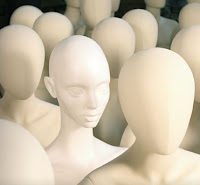The easiest answer for this sudden trend in popularity is this: most teenagers and young adults like them, and now that YA literature is hot, dystopian novels are hot, too. I can imagine why I as a young adult, just learning the shadier undersides of everything from economics to politics to religion to authority in general, would enjoy reading books where the entire world is slightly askew: to wit, it was the way I saw the world I was living in already anyway.
The term dystopian is a neologism based on another, older neologism. The term “utopia” was coined by Thomas More—as a Greek word that is actually something of a pun, the word eu-topos might mean “good place,” but the word u-topos meant “no place.” More’s Utopia, a sixteenth-century paradise where chamberpots were made out of gold (so that people were willing to part with them in times of war) and where (gasp) people lived with their partners before marrying them, was at once a “good place” but also quite obviously a “no place” during the 1500s.
Dystopia plays with the same neologism, but was invented three centuries later—however, since it is merely an inversion of the “eu”/good to “dys”/bad, it loses that nowhere vibe. Which is fitting, really: dystopias are not nowheres—they’re meant to be here. Dystopias are our society writ large, its flaws expanded and its strengths minimized, its extremists given more firepower and its moderates silenced and put under house arrest.
1984 takes England’s obsession with security and conformity and creates Big Brother; Brave New World takes Ford’s automation of cars and transfers it to the making of culture, people, and the rest; Fahrenheit 451 takes America’s squeamish anti-intellectualism and pop-culture-addled consumerism and fetches a Mechanical Hound.
The term is recent compared to More’s political satire—some say that John Stuart Mill used the term first, but couldn’t decide between dystopia or cacotopia. Obviously, dystopia has stuck in our vocabularies—and that’s revealing, too. Dystopia is simply a bad place; cacotopia (like “cacophony” versus harmony) would be a chaotic place. Few of these novels are chaotic: our most popular dystopias are very clean and run like clockwork.


No comments:
Post a Comment